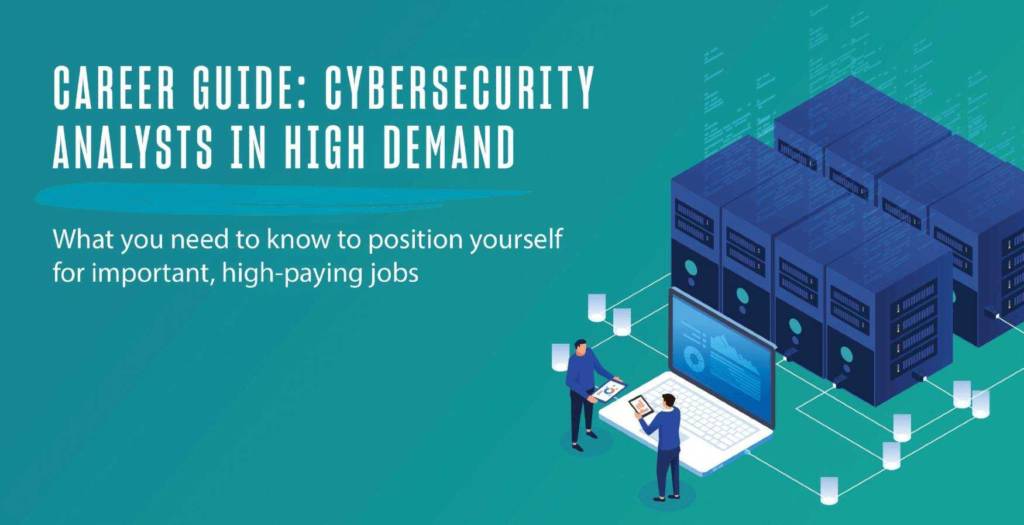Do you aspire to a high-ranking cybersecurity role and want to explore your options? A cybersecurity director position can be a rewarding opportunity that combines your technical cybersecurity expertise with managerial and leadership skills. This guide provides an in-depth look at the role, including typical responsibilities, career path and what you need in terms of education and experience.
What Is a Cybersecurity Director?
A cybersecurity director is a senior-level position that oversees and manages all aspects of an organization’s cybersecurity. This includes hiring cybersecurity personnel, ensuring compliance, managing incident response efforts and overseeing budgets.
Depending on the organization, a cybersecurity director may be the highest-ranking position overseeing cybersecurity. In larger organizations, they typically report to the chief information security officer or the chief security officer.
What Does a Cybersecurity Director Do?
The short answer is that a cybersecurity director leads and coordinates an organization’s cybersecurity efforts. The longer answer depends on the company and industry.
Here are some typical responsibilities:
- Develop cybersecurity strategies, including reviewing current protocols and adjusting as needed
- Manage cybersecurity teams and hire appropriate personnel
- Lead incident response efforts following a data breach or cyber attack
- Oversee the cybersecurity budget and resource allocation
- Coordinate and implement cybersecurity training programs
- Evaluate and choose security tools to ensure appropriate protection
To give you an idea of what real-life companies are looking for in this role, here are some responsibilities pulled from cybersecurity director job postings on LinkedIn:
- Ensure the organization complies with all relevant cybersecurity standards, with a focus on PCI requirements
- Lead the analysis, design and implementation of IT security solutions aligned with the NIST Cybersecurity Framework
- Oversee the testing, implementation and maintenance of network devices, ensuring they receive necessary upgrades, patches, and security controls
- Represent the organization in legal matters concerning IT security, when necessary
- Coordinate third-party security assessments and serve as the main point of contact for these evaluations
As you can see, the responsibilities are diverse, ranging from personnel and budgeting to legal matters and incident response.
Typical Career Path to Becoming a Cybersecurity Director
While there’s no one way to become a cybersecurity director, here’s a suggested typical career path:
- Earn a bachelor’s degree: Start with a related field such as cybersecurity, computer science or information technology.
- Obtain an entry-level position: Begin your career as an IT support specialist, security analyst, network administrator or help desk technician.
- Advance to a mid-level role: Move into roles such as a cybersecurity engineer, network security engineer or security consultant. Develop expertise in firewalls, intrusion detection systems and penetration testing.
- Obtain relevant certifications: Earn certifications such as the Certified Information Systems Security Professional (CISSP), Certified Information Security Manager (CISM), Certified Cloud Security Professional (CCSP) or Certified Ethical Hacker (CEH).
- Earn a master’s degree: While not always required, earning a master’s degree in cybersecurity or a related field can provide you with the skills and knowledge you need for higher-level roles.
- Advance to a senior-level role: Transition into senior roles such as a security architect, cybersecurity manager or senior security consultant. Focus on developing leadership, strategic thinking and decision-making skills.
- Move into a director-level role: Finally, with the right experience and education under your belt, you’ll be able to advance to a cybersecurity director position.
Education, Experience & Certification Requirements
Education
Most cybersecurity directors have a strong educational background in cybersecurity or information technology. Recommended undergraduate degrees include computer science, cybersecurity and IT management. Since this is a senior-level position, most companies prefer, and often require, a master’s degree in cybersecurity, information technology, business administration or a related field.
Experience
This position typically requires at least 8–10 years of cybersecurity experience, and some organizations may prefer 10–15+ years. A leadership background may also be required or preferred. Be sure to review the job description carefully to ensure your background aligns with the role’s expectations.
Certifications
Some roles may require or prefer particular certifications. Common ones for this position include CISSP, CISM, CEH, Certified Information Systems Auditor (CISA) and Certified in Risk and Information Systems Control (CRISC). A security clearance may be required for roles that work directly or indirectly with the government.
[RELATED] Which Cybersecurity Certifications Are Right for You?
Essential Hard & Soft Skills for Success
A cybersecurity director role encompasses a wide range of both technical (hard) and interpersonal (soft) skills. While deep expertise in cybersecurity and information technology is essential, you must also manage teams, think strategically and collaborate effectively with others.
Key technical skills and proficiencies often include:
- Comprehensive cybersecurity knowledge
- Risk management
- Incident response
- Compliance frameworks
- Experience with endpoint detection and recovery systems
- Knowledge of security monitoring solutions
Important leadership and soft skills include:
- Strong communication
- Strategic thinking
- Organization
- Problem-solving
- Collaboration
- Team management
- Deductive reasoning
Industries Hiring Cybersecurity Directors
There are organizations and businesses across nearly every industry hiring for these roles, but areas with high demand include finance, healthcare, government and technology.
Here are some examples of top companies that are hiring cybersecurity directors:
- MassMutual
- Columbus State University
- Capital One
- Wells Fargo
- Workday
- Tyson Foods
Common Challenges in the Role
While all cybersecurity roles come with challenges, a cybersecurity director often navigates issues ranging from budget constraints and personnel management to coordinating cybersecurity responses and resource allocation. They are also responsible for hiring experienced, knowledgeable personnel and managing compliance and regulatory challenges, which can change at a moment’s notice.
This means a cybersecurity director must stay up to date on the latest cybersecurity news and trends, especially as hackers and cyber threats continuously evolve. The cybersecurity landscape is always changing, and a director’s role is to adapt, think strategically and stay ahead of emerging threats.
Cybersecurity Director vs. Other Leadership Roles
If you’re searching for cybersecurity director positions, you may find similar and related roles, such as director of information security, head of cybersecurity and security operations director.
You may also come across positions such as chief information security officer (CISO), IT director and security manager. While all these positions are closely related, they are distinct from that of a cybersecurity director. Let’s take a closer look at the differences.
- A chief information security officer is an executive leadership professional who oversees information security for a business or organization. This includes everything from strategic planning and assessing risk to developing digital security policies and overseeing incident response in the event of a data breach or cyberattack.
- A director of information security focuses on protecting an organization’s digital and physical information.
- An IT director oversees an organization’s IT infrastructure, including hardware, software, networks and IT services. While they handle some aspects of cybersecurity, their focus is broader.
- A security manager is typically responsible for the physical security and other protective measures within an organization, including access control and surveillance.
- The head of cybersecurity is more of a strategic role that focuses on leadership and aligning cybersecurity initiatives with the company’s goals.
- A security operations director typically focuses on the operational side of security, including managing the day-to-day tasks.
[RELATED] Your Guide to Becoming a Chief Information Security Officer (CISO)
Cybersecurity Director Salary Insights & Job Outlook
A cybersecurity director’s salary depends on several factors, including the specific job responsibilities, size of the organization, location and how much education and experience is required. Performance bonuses and benefits will also affect compensation.
In general, cybersecurity directors make well over six figures with a base pay ranging from $166,000–$234,000 according to Glassdoor and Salary.com, which projects an annual media salary of $215,200. It’s also important to note that salary information will fluctuate based on available data.
Employment of information security analysts, a closely related position, is projected to grow 33% between 2023 and 2033. Senior-level positions may be in less demand due to fewer available roles, but overall, cybersecurity continues to offer strong opportunities.
Key Tips for Advancing to Director Level
If you aspire to become a cybersecurity director, it’s crucial to stay informed on the latest cybersecurity news, emerging threats and advanced technologies. The industry is constantly evolving, so what was front and center just a few months ago may no longer be relevant today.
Check out key job posting resources such as LinkedIn, CyberSecurityJobs.com, USAJOBS, CareersinCyber.com.
As you advance in your cybersecurity career, seek opportunities to develop and refine your leadership and communication skills. Take on new projects and look for ways to lead and manage others. Showcase both your technical and soft skills to demonstrate your versatility.
Since a director-level position involves much more than just cybersecurity, you’ll want to gain experience in areas like budgeting, vendor management and policy development.
Finally, it’s essential to network and build connections within the cybersecurity industry. Join professional associations, attend conferences and workshops and consider volunteering to speak at cybersecurity events or serve on panels.
Take the Next Step Toward Becoming a Cybersecurity Director With a Master’s Degree From USD
As you explore a master’s degree in cybersecurity, consider these two programs offered by the University of San Diego.
The 100% online Master of Science in Cyber Security Operations and Leadership program is designed for career-focused professionals interested in gaining a deeper understanding of cybersecurity concepts, topics and theories, along with leadership skills. Students will gain specific knowledge and skills in technology, law, policy, compliance, governance, intelligence, incident response and management.
USD’s Master of Science in Cyber Security Engineering has been designated as a National Center of Academic Excellence in Cybersecurity. Each CAE-designated program equips students with the necessary skills, knowledge and tools to succeed in cybersecurity.
USD’s Master of Science in Cyber Security Engineering, which is offered both on-campus and online, is ideal for recent graduates and skilled professionals with an engineering background who are currently working in a wide range of cybersecurity roles or aspiring to work as security engineers.
Looking for more information? Download the eBook 10 Reasons to Get Your Masters in Cyber Security.




